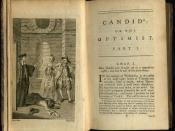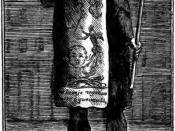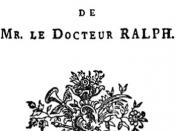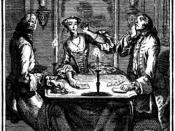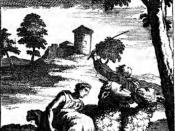Candide is a man that believed in his mentor, Pangloss, that said their world is "the best of all possible worlds" and that undiluted optimism is the philosophy to follow. Voltaire's Candide, takes the reader through series of experiences and troublesome adventures that the protagonist, Candide, produces through his beliefs. He finally recognizes the imperfections of the so-called "perfect world" and man's inability to neither conquer, nor comprehend evil in the world.
Candide's adventures begin with his expulsion from the castle. The series of misfortunes that befall him serve as education to his experience with his world. His actual experiences in the real world directly contradict Pangloss's optimism. Instead the world is a terrible place full of evil, cruelty and suffering.
The hidden kingdom serves as a crucial mistake of his assessment that his world is the "best of worlds". Gold and precious jewels are "common pebbles" in the hidden kingdom.
However, Candide's adventures demonstrate that the plentiful jewels and gold are not the reason the kingdom is the "best of all possible worlds." The kingdom is a utopia because it does not suffer from religious persecution, petty squabbles, or horrendous social inequality. Candide was distracted by the glitter of things that the kingdom itself holds as worthless.
Near the end of the novel, Candide, Pangloss, Martin and Cunegonde, visit with a Turkish old man. As the group visits, Candide visions the Turk's estate to be "vast and magnificent". The Turk replies, "I have only twenty acres"æ"ÃÂ(86), his land is small but is safe from three great evils: "weariness, vice, and want."ÃÂ(86) He adds that his family's labor preserves them from such tribulations. The old man claims those who engage themselves in public affairs rarely come to a good end. Candide learns here that this family merely works hard on their land, and they have a tolerable existence with it.
As a result to all his lessons he has learned, Candide appropriately says, "we must cultivate our garden."ÃÂ He has learned that his world is not the best of all worlds and everything is not for the best. He finally realizes that the best way to live life is not through optimism but through practicality. For example, Adam and Eve's time before evil existed, there was no need in hard work. Adam and Eve had the Garden of Eden provided to them. As sin took over, they had to work and strive for happiness. This relationship of cultivation and hard work is what took Candide so long to realize.
Candide's early life was accompanied by teaching of pure optimism in the world. "Everything is for the best,"ÃÂ and "Best of all possible worlds,"ÃÂ were the basic beliefs that he had faith in and followed. His ventures through unknown lands that possess realism finally opened his eyes. Candide and his friends decide to give up their philosophic ideals in exchange for productive practicality. This change in focus allows them to give up hopefulness and interest in philosophical debates in favor of practical, hard work.
